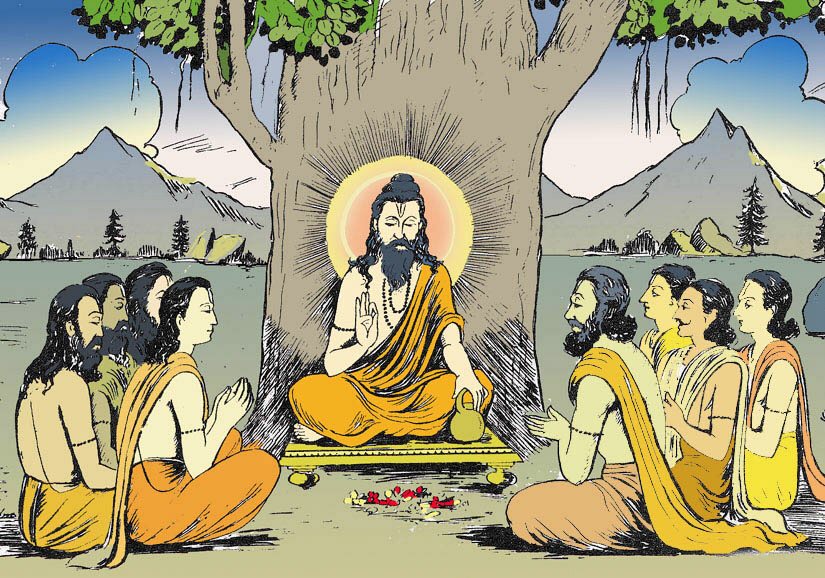The Vedas and the Bhagavad-gita especially are not new to the Western world. There have been seekers, writers, poets, philosophers, and people of all levels who have appreciated the depth, inspiration, and insight of Vedic thought for many years. For centuries, interest in India, where the Vedic literature originated, was usually for reasons of trade. Goods like spices, jewels, and fine cloth were always in demand. Even Marco Polo wrote of seeing the great wealth of India and described it as one of the richest countries in the world. Christopher Columbus read Marco Polo’s descriptions and devised a plan to find a new route to India. (He discovered America instead.)
This interest in India continued, but in the early 1800’s the traders of Indian goods also began bringing with them books in Sanskrit. Sanskrit literature started to become popular. Up to the end of the civil war in America, the influence of Vedic thought continued to spread. This was especially noticeable in places such as Concord, Massachusetts where personalities like Henry David Thoreau, Ralph Waldo Emerson, Amos Bronson Alcott, Minister James Freeman Clark, and others began to express in their writing the philosophical insight which was inspired directly by the Vedic literature. Emerson in particular was known to have read such Vedic books as the Bhagavad-gita, Vishnu Purana, Laws of Manu, Bhagavata Purana, and even the Kathopanishad. One quote of his is: “I owed a magnificent day to the Bhagavad-gita. It was the first of books; it was as if an empire spake to us, nothing small or unworthy, but large, serene, consistent, the voice of an old intelligence which in another age and climate had pondered and thus disposed of the same questions that exercise us.”

Henry David Thoreau is also well known for his philosophical leanings in his writings. He was an avid reader of Vedic literature and openly expressed his admiration for Vedic thought. During his stay at Walden Pond, he would regularly read Bhagavad-gita. Thoreau once remarked, “What extracts from the Vedas I have read fall on me like the light of a higher and purer luminary, which describes a loftier course through a purer stratum.” Also, “In the morning I bathe my intellect in the stupendous and cosmogonal philosophy of the Bhagavad-gita, since whose composition years of the gods have elapsed and in comparison with which our modern world and its literature seems puny and trivial.” (Walden, Chapter XVI)
Thoreau was so impressed with the Bhagavad-gita that he went on to say: “The reader is nowhere raised into and sustained in a bigger, purer or rarer region of thought than in the Bhagavad-gita. The Gita’s sanity and sublimity have impressed the minds of even soldiers and merchants.” He also admitted that, “The religion and philosophy of the Hebrews are those of a wilder and ruder tribe, wanting the civility and intellectual refinements and subtlety of Vedic culture.” Thoreau’s reading of literature on India and the Vedas was extensive: he took it seriously. Even Mahatma Gandhi respected him and accepted him as his teacher.
Other recognized writers that were influenced by Vedic philosophy were T.S. Eliot, Paul Elmer More, and Irving Babbitt, all of whom had studied at Harvard under the great Sanskrit teacher Charles Rochwell Lanman who taught for over forty years and also published works on Sanskrit and Hindu philosophy. As Harvard had a succession of outstanding teachers of Sanskrit, so did Yale, but even earlier. In fact, Elihu Yale had a deep respect for Vedic philosophy.
Part of the reason for introducing the study of Sanskrit and Eastern philosophy in universities was due to the influence of such organizations as the American Oriental Society, which was founded in 1842. Through the years, there have been many great Sanskritists and American Indologists who have helped point out how unique and profound is the Vedic philosophy. Such people include Edward Elbridge Salisbury (1814-1901), who went to India and continued his studies there; Fitzedward Hall (1825-1901); William Dwight Whitney (1827-1901); Edward Washburn Hopkins (1857-1932); James Bradstreet Greenough (1833-1900); and many others. Not only in America but in other Western countries the ideas from India were received among interested intellectuals, some of whom were Max Mueller and Aldous Huxley of England, Romain Rolland of France, Tolstoy of Russia, and Schlegel, Deussen and Schopenhauer of Germany. In fact, Schopenhauer went so far as to predict that the Vedas would one day be accepted as the religion of the world.

This concept of exchanging ideas and culture can no doubt more easily be seen in recent times as many sages and svamis from India have come to America to teach students, and Western students have gone to India in search of teachers. Surely, this is no accident: for while America is rich in modern technological know-how but seems to lack spiritual vision, India, on the other hand, has been rich in spiritual heritage.
This is similar to the example of a blind man and a lame man working to help each other. The blind man may be able to walk or even run, but without eyes he may run many miles in the wrong direction. And a lame man may be able to see where to go but move only with great difficulty. In this way, they help each other accomplish their goals. So, it is natural, as in this example, for the East and the West to assist each other until a proper combination is found. It has been understood by great thinkers that this combination of East and West can be accomplished through the study and utilization of the Vedic philosophy, culminating in the Bhagavad-gita, in which case they will produce the epitome of human civilization.
In this way, numerous writers and poets of the West, which we have admired for years, have gotten much of their inspiration from Eastern philosophy. Thus, the Bhagavad-gita has already made a definite contribution to the spiritual and intellectual development of Western society.
By Stephen Knapp
source: stephen-knapp.com


